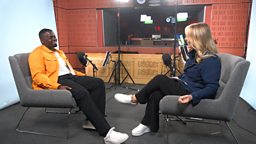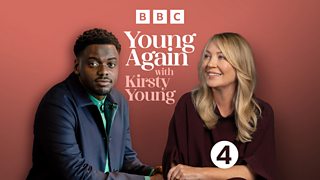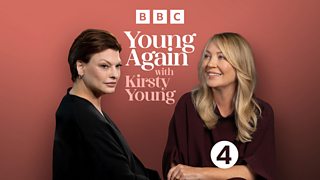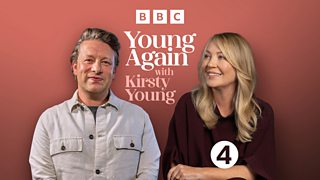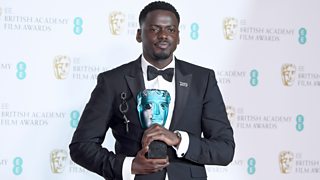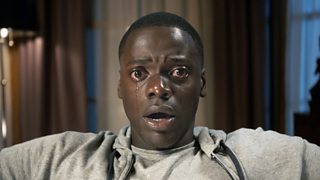Daniel Kaluuya: Seven things we learned when he spoke to Kirsty Young
In her 大象传媒 Radio 4 podcast Young Again, journalist and broadcaster Kirsty Young takes her guests back to meet their younger selves and asks the question: if you knew then what you know now, what would you have done differently?
In this episode Kirsty meets Oscar, Golden Globe and BAFTA winner Daniel Kaluuya. He was in the first two series of Skins, the hugely influential Channel 4 TV drama series, also co-writing several of the episodes before getting his big acting break in 2017, starring in Jordan Peele's acclaimed horror film Get Out. He has since gone on to starring roles in Black Panther, Widows, Nope, and Judas and the Black Messiah.
Here are seven things we learned…
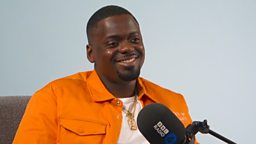
1. Daniel has just made his first feature film
At the age of 34 he’s just co-written, co-produced and co-directed The Kitchen, a dystopian science-fiction drama set in a future London.
A teacher said to my mum, 鈥楬e's got a lot of energy, he should get into acting...'
Daniel says that despite the many obstacles - “all the politics, all the people, all the noise, all the egos, all that kind of stuff, it gets challenging to remind yourself why you wanted to do it, and then when you watch it, you go, ‘Oh, it's this.’ You just want to say something. That's it, but like words aren't good enough.”
“What do you want to say?” asks Kirsty.
Daniel pauses for thought: “I think it's about compassion and forgiveness. And going, ‘Who don't we like? Who's the archetype of people who we don't like that's universally disregarded? And how do you understand them. How are you similar to them?’”
"Cause you’re only really going to forgive someone if you see your similarities in them, I think.”
2. He wrote his first play aged nine
The initial impetus came from a teacher but not in the way that you might expect.
“There was a competition and some teacher pissed me off, so I just was like, ‘Oh, you always tell me to shut up, man’, so I just wrote a play,” says Daniel.
“She was trying to say - because I was messing about, ‘Oh, Daniel, look this person's [one of Daniel’s classmates] written a play and you haven't.’”
“And I said, ‘Alright, cool. I'm going to show you I can write.’ But I always knew I could for whatever reason. I just wrote this play and then I got to the next round.”
Not only did he get to the next round but he won the competition and his play, based on two people working in McDonald’s, was performed at the Hampstead Theatre.
“It was cool,” says Daniel with real understatement, “and my whole school year there. It was cool. And they’re just saying words that I wrote.”
3. A poem about a spider helped him understand different perspectives
From an early age Daniel could understand, “how a scene takes two different points of views.”
“And so even at 10, I wrote – I never even told anyone this – at 10, I wrote a poem, it got published, about a spider – because I was scared of spiders, so I wrote a poem from the spider’s point of view. It goes, ‘Ah, this brother hates me...’”
"I wrote that. I just knew how, I just knew how to do that.”
4. Daniel knew that he could write but what got him into acting?
“Because a teacher said to my mum, ‘He's got a lot of energy, he should get into acting.’ I think I was a class clown.”
“So then, my mum just listened because... You know, I really, wanted to be a boxer - she didn't listen to that. And then I wanted to do football but she couldn’t engage with football like that. Then I would produce beats, I used to sing, I pissed off my music teacher so then that got taken back. So I was just left with acting.”
5. Olivia Colman told Daniel not to go to drama school
"That was when I wrote that episode [of Skins]. I got into drama school, and I did Mitchell and Webb [the comedy sketch show with David Mitchell and Robert Webb] and we got the car home.”
“I just spoke to her about it because I didn't know actors like that. I was like ‘What should I do?’”
“Because basically it was either go to drama school or write an episode of Skins. I talked it through with her.”
“And then she was like, ‘Yeah, I think it sounds like you should do that, ‘cause it sounds like your agents are really good, so you could be a thing and you can always defer it [the place at drama school].’”
“She just felt very kind, you know, I mean, like, she didn't really want anything from me.”
“Basically, she left the space for me to listen to myself… she's mad cool.”
6. Role models – did he have them and does he consider himself one?
“My Uncle Sam in Uganda was a big male role model for me, my mum, Ian Wright,” says Daniel, a huge Arsenal fan.
“Yeah, that's really about it... So Solid Crew... I just thought, ‘I feel them.’ So Solid Crew made me want to get an Audi TT, but I ain't got around to it yet,” adds Daniel laughing.
So Solid Crew were an influential UK garage collective in the early 2000s that included Ashley Walters, who has gone on to also find success as an actor, appearing as the lead role in the TV series Top Boy.
Daniel is involved in many initiatives to engage young people with the performing arts. Does he see himself as a role model, asks Kirsty.
“What’s that Tupac quote?” replies Daniel, “’Role is something you play, model is something you make. Both of them are fake.’ So I kind of move like that. I'm just going, ‘Yo! I'm me if you want to look at me like this, cool.’ But I'm just going to be me, and I'm going to mess up, I'm going to come back, I'm going to do it, I'll figure things out, I'm going to go for it, I'm going to give it my best, I’m going to give my all.”
7. As an actor he says rejection isn’t all bad, it’s like exercise
Daniel says he would see being rejected for a part: “As emotional fitness. It would hurt at the beginning when I started going and not getting things that you really wanted, it would hurt.”
"Then I got better at coping with it. And then I saw it like, ‘Yeah, you're never going to get fit enough where you can't feel the kind of the tiredness of whatever exercise you're doing, because that's what the point is, it’s about growth. It’s just that your recovery gets quicker.”
“I'm not saying I wasn't affected if it didn't go my way, I was. But then I was like, ‘Cool, I gotta go again for the next one, and the next one. A lot of those roles that I didn't get would then come back because the casting director would remember that I did the best I could in the room.”
